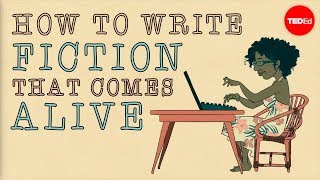(单词翻译:单击)
We read fiction for many reasons.
我们出于很多原因去阅读小说。
To be entertained, to find out who done it, to travel to strange, new planets, to be scared,
找乐,找出真相,穿越到陌生的新星球,被惊吓,
to laugh, to cry, to think, to feel, to be so absorbed that for a while we forget where we are.
大笑,哭泣,思考,感受,为了沉浸其中而忘记自己身在何处。
So, how about writing fiction? How do you suck your readers into your stories?
那么,写小说呢?你怎样把读者吸引到自己的故事中呢?
With an exciting plot? Maybe. Fascinating characters? Probably. Beautiful language? Perhaps.
用精彩的故事情节?可能。用引人入胜的角色?大概。用优美的语句? 也许。
'Billie's legs are noodles. The ends of her hair are poison needles.
“比利的腿像面条一样。她的发梢像毒针。
Her tongue is a bristly sponge, and her eyes are bags of bleach.'
她的舌头像有毛的海绵,眼睛像是漂白的袋子。
Did that description almost make you feel as queasy as Billie?
这种描述是否几乎使你像比利一样感到眩晕作呕?
We grasp that Billie's legs aren't actually noodles.
我们知道比利的腿并不是真正的面条。
To Billie, they feel as limp as cooked noodles.
对于比利来说,它们像煮熟的面条一样无力松软。
It's an implied comparison, a metaphor.
这是一个隐晦的对比,叫做“暗喻”。
So, why not simply write it like this? 'Billie feels nauseated and weak.'
那么,为什么不直接这样写:“比利感到反胃和虚弱。”
Chances are the second description wasn't as vivid to you as the first.
很可能是因为第二种描述不像第一种那样生动有趣。
The point of fiction is to cast a spell, a momentary illusion that you are living in the world of the story.
小说的关键是施加一个咒语--一种让读者置身于故事中的短暂幻觉。
Fiction engages the senses, helps us create vivid mental simulacra of the experiences the characters are having.
小说调动感官,帮我们营造一种关于主人公经历的生动的精神幻象。
Stage and screen engage some of our senses directly.
舞台和荧屏直接调用我们的一部分感官。
We see and hear the interactions of the characters and the setting.
我们看到、听到那些剧中人物和场景的互动。
But with prose fiction, all you have is static symbols on a contrasting background.
但是对于单调的小说来说,你所拥有的只是一些在对比鲜明的背景之上的静止符号。
If you describe the story in matter of fact, non-tactile language, the spell risks being a weak one.
如果你用事实性的、没有质感的语言来描述故事,那个咒语的功能可能就比较弱。
Your reader may not get much beyond interpreting the squiggles.
你的读者除了理解那些文字之外,可能不会收获更多。
She will understand what Billie feels like, but she won't feel what Billie feels.
她知道比利的感觉,但是她不会感同身受。
She'll be reading, not immersed in the world of the story,
虽然她在阅读,但并没有沉浸到故事中去,
discovering the truths of Billie's life at the same time that Billie herself does.
她只是同比利自己一样,发现了关于比利生活的真相。
Fiction plays with our senses: taste, smell, touch, hearing, sight, and the sense of motion.
小说依赖于我们的感官:味觉,嗅觉,触觉,听觉,视觉,以及动感。

It also plays with our ability to abstract and make complex associations.
它还依赖于我们的抽象、联想能力。
Look at the following sentence.
来看下面这个句子。
'The world was ghost-quiet, except for the crack of sails and the burbling of water against hull.'
“世界像幽灵般寂静,除了船帆的断裂声,以及水拍打船身的汩汩声。”
The words, 'quiet,' 'crack,' and 'burbling,' engage the sense of hearing.
“寂静”,“断裂”,”汩汩“这些词,和听觉相关。
Notice that Buckell doesn't use the generic word sound.
注意,巴克尔没有用那个通常会用的词--声音。
Each word he chooses evokes a particular quality of sound.
他选择的每个词都能激发一种特殊的声音质感。
Then, like an artist laying on washes of color to give the sense of texture to a painting,
然后,像画家涂抹颜料以赋予一幅画质感一样,
he adds anoter layer, motion, 'the crack of sails,' and touch, 'the burbling of water against hull.'
他添加了另一层,动感,“帆的断裂,”,和触觉,“水拍打船身的汩汩声。”
Finally, he gives us an abstract connection by linking the word quiet with the word ghost.
最终,他给我们一种抽象的连接,通过把”寂静“和”鬼魂“这两个词放在一起。
Not 'quiet as a ghost,' which would put a distancing layer of simile between the reader and the experience.
不是“像鬼魂一样寂静”,这样会把一种间离性的明喻置于读者和经验之间。
Instead, Buckell creates the metaphor 'ghost-quiet' for an implied, rather than overt, comparison.
相反,巴克尔用“鬼魂般的寂静”的比喻,来形成一个暗含的而非明显的比较。
Writers are always told to avoid cliches
作家们通常被告诫要避免陈词滥调,
because there's very little engagement for the reader in an overused image, such as 'red as a rose.'
因为在一个用烂了的形象中,读者很难投入进去,如“像玫瑰一样红。”
But give them, 'Love...began on a beach. It began that day when Jacob saw Anette in her stewed-cherry dress,'
但是如果给他们,“爱情...开始于沙滩上。它始于当雅各布看到穿着一身'烩樱桃'裙子的安奈特时”,
and their brains engage in the absorbing task of figuring out what a stewed-cherry dress is like.
这时读者们就开始在头脑中猜想“烩樱桃”的裙子是什么样的。
Suddenly, they're on a beach about to fall in love.
突然,他们在沙滩上即将陷入爱河。
They're experiencing the story at both a visceral and a conceptual level,
他们在本能的和观念的层面上同时经历着故事,
meeting the writer halfway in the imaginative play of creating a dynamic world of the senses.
见到作者正在一个想象性的戏剧中创造一个感官的动态世界。
So when you write, use well-chosen words to engage sound, sight, taste, touch, smell, and movement.
所以当你写作时,用那些精心选择的词汇,以调动听觉、视觉、味觉、触觉、嗅觉,和运动。
Then create unexpected connotations among your story elements, and set your readers' brushfire imaginations alight.
然后在你的故事元素之中创造一些出其不意的暗示,以点燃读者的想象力。


